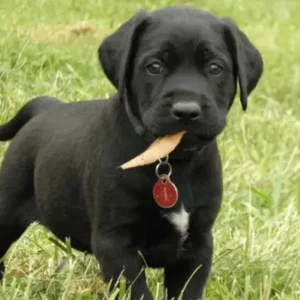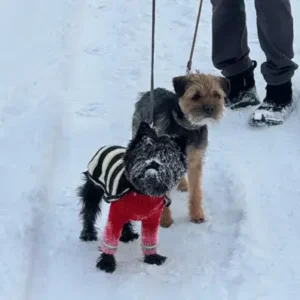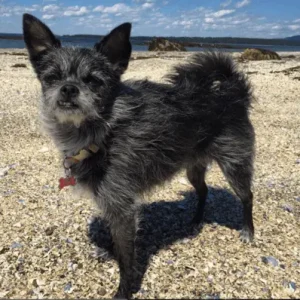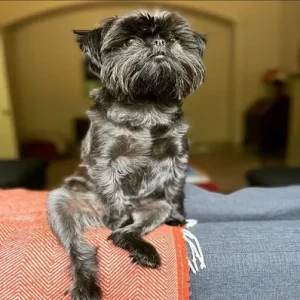Chow Chow History/Origin
Genetic testing confirms that the Chow Chow is one of the oldest dog breeds. Originating in Mongolia and Northern China, they migrated south with nomadic tribes—depictions of Chow Chow’s date back to the Han Dynasty (206 BC to 22 AD).
One Chinese emperor reportedly kept 2,500 pairs as hunting dogs. Besides hunting, they were prized as guardians, their fur used for coat trimming, and their flesh considered a delicacy.
Historically, the breed had names like black-tongue, wolf, bear, and Canton dogs. The name “Chow Chow” originated with British merchants in the late 18th century. They used “chow chow” to refer to miscellaneous items, including dogs.
This name stuck, and in 1781, naturalist Gilbert White described the breed in his book “Natural History and Antiquities of Selbourne.” Fanciers believe the breed has changed little since then.
Chow Chow history- Source: Chow Chow Club of Victoria
Chow Chows began regular importation about a century later. Queen Victoria’s interest boosted their popularity. The breed club was formed in England in 1895. In the United States, Takya was the first Chow Chow shown at the Westminster Kennel Club in 1890.
The American Kennel Club (AKC) recognized the breed under Non-Sporting Group in 1903, with Yen How being the first registered Chow.
During the 1920s, the breed became popular among the elite. Currently, this purebred ranks 64th in popularity among the 155 breeds recognized by the AKC.
Chow Chow Personality
The Chow Chow is one of the dog breeds known for its dignified, independent nature, often likened to that of a cat. These dogs are typically reserved and prefer to keep to themselves rather than seek constant attention. Despite their aloofness, they form strong bonds with their families and are fiercely loyal.
While they may seem distant from strangers, they are protective and will assertively guard their homes. Early socialization is crucial to ensure they are well-adjusted and confident, preventing any behavior issues related to their natural reserve. Though they can be stubborn, with proper training and leadership, they make devoted and reliable companions.
- Potential challenges
Chow Chows can present challenges due to their independent nature, which makes training them difficult. They tend to be reserved around strangers, so early socialization is important to avoid any behavior issues. Their thick coat needs regular grooming to prevent mats and keep them comfortable.
Chow Chow Physical Appearance
The Chow Chow is a medium-sized dog with a sturdy, square body and a lion-like appearance typical of the Spitz family. It has a large, broad head, a short and deep muzzle, and upright ears with rounded tips. The tail is set high and carried over the back, highlighting its square body shape, while its hind legs lack angulation, giving it a unique, stiff-legged walk that’s essential to its breed type.
- Size
Chow Chows are known for their sturdy build and compact frame, contributing to their distinctive appearance. They typically stand between 17 to 20 inches tall at the shoulder, with weights ranging from 45 to 70 pounds.
- Coat color
Chow Chows come in two coat types: rough and smooth. The rough coat, commonly seen, is thick and abundant. Underneath the outer coat lies a soft, thick, woolly undercoat. Both coat types are available in five colors: red, black, blue, cinnamon, and cream. The colors may be solid or have lighter shadings in the ruff, tail, and feathering.
Chow Chow Gender Differences
Male Chow Chows typically lean towards larger sizes compared to their female counterparts. However, both males and females of this breed should exhibit a broad, square-built, and powerful appearance as they mature. Beyond size, their temperament and characteristics remain largely similar regardless of gender.
Chow Chow Feed/Nutrition
For a Chow Chow, it’s recommended to feed them 2 to 2 3/4 cups of high-quality dog food daily, split into two meals. The amount your adult Chow Chow needs depends on factors like size, age, metabolism, and activity level.
Just like people, dogs have varying nutritional needs. More active dogs require more food, while the quality of the food affects nourishment, allowing smaller portions to suffice.
To maintain optimal health, it’s crucial to measure and serve your Chow Chow’s food twice daily instead of leaving it out continuously. Adding apples as an occasional treat can provide a healthy snack, but be sure to remove the seeds and core before serving.
Chow Chow Health
Chow Chows, while generally robust, can be susceptible to several health issues:
- Hip Dysplasia: This hereditary condition affects the hip joints, causing discomfort and reduced mobility as the dog ages. Regular vet check-ups and appropriate exercise can help manage this condition.
- Elbow Dysplasia: Similar to hip dysplasia, this condition affects the elbows, potentially leading to lameness and joint pain. Early detection through veterinary examinations is crucial for effective treatment.
- Entropion: Chow Chows may experience entropion, where the eyelids roll inward, irritating the eyes and causing discomfort. Surgical correction may be necessary to alleviate symptoms.
- Canine Gastric Torsion: Known as bloat is a serious condition in which the stomach fills with gas and twists, cutting off blood flow. Immediate veterinary intervention is essential to save the dog’s life.
- Allergies: Skin allergies and food sensitivities can trouble Chow Chows, causing itching, skin irritations, and ear infections. Identifying and avoiding allergens, along with veterinary guidance, can help manage these issues.
- Cataracts: Chow Chows are prone to developing cataracts, a clouding of the eye’s lens that can impair vision. Regular eye exams can detect early signs, allowing for appropriate management and care.
Chow Chow Care and Grooming
To maintain a Chow Chow’s coat and minimize shedding, regular brushing is key. Use a Greyhound comb, slicker brush, and pin brush, misting the coat with a diluted conditioner to prevent matting. Brush the coat slightly damp to avoid breakage.
Grooming also includes dental care and nail trimming. Brush their teeth two to three times weekly, and trim nails monthly to maintain health.
Chow Chows need daily exercise, typically a 30-45 minute walk, to stay healthy and avoid boredom. Start grooming early in puppyhood, making it a positive experience with praise and rewards.
Leash training your dog early is key, as Chow Chows are independent; consistency ensures safe, enjoyable walks.
Chow Chow Rescue Groups
Rescue groups dedicated to Chow Chows specialize in finding loving homes for these majestic dogs in need. They provide sanctuary, rehabilitation, and adoption services, ensuring each Chow Chow receives the care and attention necessary for a second chance at a happy life. These groups also educate potential adopters about the breed’s specific needs and characteristics to promote responsible ownership and lifelong companionship.
Chow Chow Price
The price of a Chow Chow typically ranges from $1,200 to $2,000, depending on factors such as breeder reputation, pedigree, and location.
When purchasing a Chow Chow from a reputable breeder, ensure they prioritize the health and well-being of their dogs. Responsible breeders provide health clearances for genetic conditions and offer a nurturing environment for their puppies. Avoid sources that prioritize profit over the welfare of the animals.
Interesting Facts
- President Calvin Coolidge kept Timmy, a red Chow, and Blackberry, a black Chow, in the White House.
Blackberry- Source: Presidential Pet Museum
- Sigmund Freud and his daughter Anna also favored the breed, with Anna breeding them.
Freud and his Chow in 1952- Source: Chowtales
- Martha Stewart has featured her Chow Chows on her TV show.
Martha Stewart with Chow Chow- Source: Martha Stewart
Best For
The Chow Chow is best for people who value a dignified and independent pet. They do well with owners who can provide calm leadership and are experienced with their needs. Training and socialization are crucial for them to thrive as loyal and devoted companions.
Top Names
| Male Chow Chow Names | Female Chow Chow Names |
| Simba | Bella |
| Thor | Luna |
| Shadow | Chloe |
| Winston | Daisy |
| Teddy | Sasha |

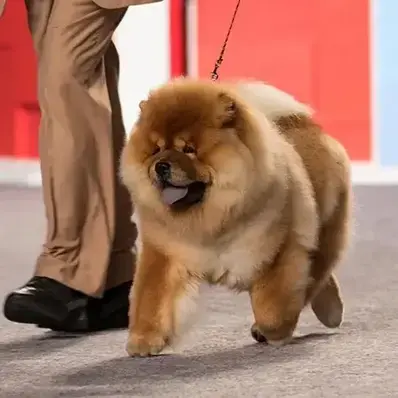







 Chow Chow history- Source:
Chow Chow history- Source: 

 Cream Chow Chow- Source:
Cream Chow Chow- Source:  White Chow Chow- Source:
White Chow Chow- Source:  Red Chow Chow- Source:
Red Chow Chow- Source:  Cinnamon Chow Chow- Source:
Cinnamon Chow Chow- Source: 
 Blackberry- Source:
Blackberry- Source:  Freud and his Chow in 1952- Source:
Freud and his Chow in 1952- Source:  Martha Stewart with Chow Chow- Source:
Martha Stewart with Chow Chow- Source: 

